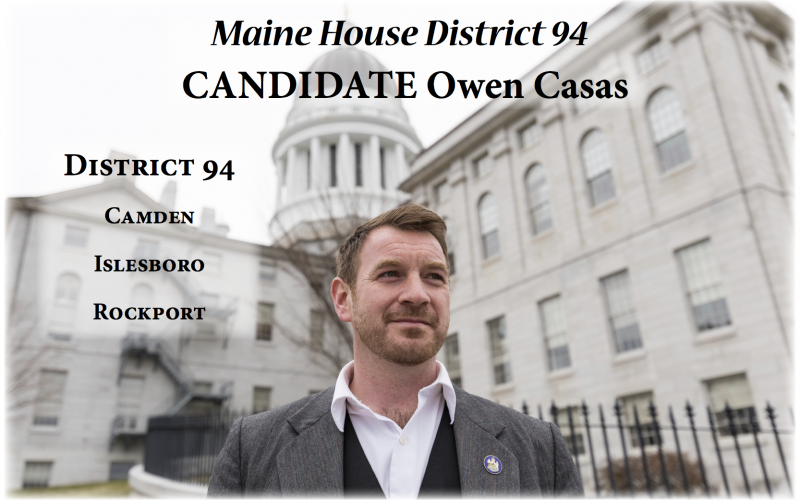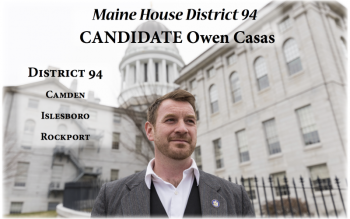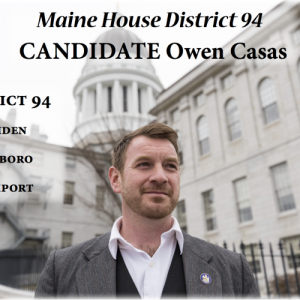Q&A: Maine House District 94 Candidate Owen Casas
Owen Casas, I-Rockport: I was born and raised in Midcoast Maine. Growing up here I learned a lot about hard work and, as the old timers would teach me, making something out of nothing. I raked blueberries in Union and washed dishes in Camden until my older brother and father asked if I wanted to tend to them as stone masons. I continue to do masonry to this day.
Wanting to explore the world and my physical limits, I joined the U.S. Marines at 18 and served 4.5 years around the country and overseas in Fallujah, Iraq.
Returning home after the Marines I worked offshore in commercial fishing before enrolling at University of Maine on the GI Bill. My wife and I met as I enrolled in school so between homework and test prep I was changing diapers as our first two children were born during my undergraduate studies. Our third child was born just before I started my master’s program at Case Western Reserve University’s Weatherhead School of Management.
Prior to being elected to the Maine House of Representatives in 2016 I served on the Rockport Select Board for three years, where I was a liaison to many community groups and finished my final year as vice-chairman. I still serve on the Mid Coast Solid Waste Corp, currently as the Board of Directors chairman and was elected to the Rockport Budget Committee in June of this year.
In my legislative capacity I serve on the Veterans and Legal Affairs Committee, with a Republican and Democrat sitting on either side of me. I have enjoyed learning from these diverse legislators as I evaluate public policy for the citizens of Camden, Rockport and Islesboro.
I am running for re-election because I think it is important to have competent and energetic moderate independents in government.
The list of priorities of state government is long, including the heroin/opioid epidemic, affordable health coverage, growing and diversifying Maine’s economy, elder care, public education funding, municipal revenue sharing, broadband expansion, long term infrastructure funding and many more.
These issues need to be sorted out in large part by an organization (the state legislature) that isn’t functioning very well right now. As the level of partisanship continues to rise, it is extremely important that non-party affiliated (independent) legislators with experience be returned to state government. Having observed some of the major issues holding up progress, and now understanding the mechanics and process government follows, I look forward to working with Democrats, Republicans and the 20 independent candidates running for office to address the structural issues that keep the legislature divided.
2) What are the three most pressing issues facing Maine today, and how would you like to see them resolved?
- Functioning Government
- Functioning Government
- Functioning Government
As I reflect on the issues mentioned in my opening comment, I can’t help but realize that all of them need input, guidance or resolution from an institution (Maine Legislature) that isn’t functioning all that well. The big issues of our time are going to take an all hands on deck approach to be successfully accomplished, so to me, as a legislator, the most pressing issue facing Maine is how to narrow the partisan divide in government. One way of accomplishing this is by electing more nonpartisan independents.
How will you protect the local (municipal) taxpayer as you help shape a state budget?
Restore revenue sharing to historic levels or reduce state mandates given to municipalities. Be thoughtful about our fiscal and economic situation as we separate needs from wants.
The first thought to keep in mind when crafting any budget is differentiating between needs and wants. An example could be this: a state agency needs to have resources for “essential services” necessary for government to perform its basic functions. That same agency might want more resources for new programming they deem important. Some wants become needs over time but those items should be robustly debated in the legislature, as we publically discuss the best way to spend (or not) precious taxpayer dollars.
Having served on the Rockport Select Board for three years, I have engaged in crafting budgets, as well as helping folks who are delinquent on their property taxes stay in their homes.
This experience was very helpful as the independent legislators worked on crafting a tax conformity compromise, where we placed a premium on property tax relief. As a short term help to the property tax burden many are facing, our tax package doubled the Property Tax Fairness Credit.
Penobscot Bay Pilot has posed questions to each candidate running for District Attorney, Maine Senate and Legislature, providing the opportunity for the public to better understand their position on issues important to the state. The candidates have responded with their individual written answers.
Specific to municipal tax payers paying local property taxes, I strongly believe the state needs to resolve municipal revenue sharing funding levels. I see two general options. One is to keep revenue sharing where it is today, which is much lower than historic levels, and figure out what municipal mandates (responsibilities placed on the municipality by the state) will become responsibilities of the state. The other option is to keep the mandates how they currently are and restore revenue sharing back to its historic levels.
Existing state statute states that we will return to historic revenue sharing levels in 2020 (from existing 2 percent up to historic 5 percent) so this issue should be worked on soon.
Scientists have reported that the Gulf of Maine is warming (Gulf of Maine experiences marine heat wave, scientists say and Senators Collins, King push for research into warming of Gulf of Maine).
How will you work to ensure that Maine’s fisheries are vital and productive, and that the habitat and marine life are protected?
Promote and support renewable energy sources that help, not hurt, the health of our planet. Monitor human based sources of pollution and ensure a reasonable regulatory structure that allows business to thrive in concert, not conflict, with our environment.
It is useful to refresh our minds on what is “within our control” and what is not. “State Waters” (for Maine) extend three nautical miles from our coastline (including our islands). Beyond that are “Federal Waters” then “International.” Although fishing fleets have to respect these boundaries and abide by rules, pollution and marine debris do not. To restore the health of our marine environment we need an all hands on deck strategy: local, state and federal.
Specific to Maine and our “control” I support the following:
- Limiting and regulating the land based human activities that negatively affect the Gulf of Maine. An example could be industrial scale fertilizers that run off agricultural fields into our rivers and streams, eventually making their way into our marine environment.
- Measuring and observing the health of a fish (shell or otherwise) stock and setting “catch limits” that allow the stock to grow and maintain stability overtime.
- Have a regulatory structure that encourages diversification of development in our marine environment. Specifically aqua culture farming that, if done properly, can actually help with the health of our oceans. Kelp farming is an example.
What are your positions on energy policies and use of renewable energy (solar, wind, tidal turbine)? Should the state of Maine encourage renewables with tax and policy development?
I continue to strongly support the expansion of renewable energy. In regard to renewable energy sources being our primary grid energy source (read as “base load”), I recognize and respect that there are still some lingering issues. That said, we as society and government should spare no efforts in advancing integration and expansion of renewables. I have consistently sponsored and voted in favor of pro renewable energy policies.
Prior to the failed veto override vote on a more favorable solar policy, I remember discussing solar with a Republican, who was trying to convince me to support the veto (I voted to override the veto).
What struck me about the conversation was how both of our “facts” could be true, depending on how narrow or broad you constrained your thinking. For example, when viewed very narrowly, the cost of creating usable electrons for our grid can be more expensive for renewables than “traditional” fossil fuels. However if you were to take a more broad, comprehensive and whole systems view it quickly becomes clear that renewable energy is more cost effective.
When factors like the negative health effects of breathing polluted air, invasive species expansion disrupting natural resource based economic activity, recovery efforts in the wake of storms that are increasing in magnitude and shoreline improvements needed to combat rising sea levels (just to name a few), renewable energy becomes more and more appealing.
It is also important to note the positive economic impact of renewable energy. These are good jobs, with installers being paid well to use both their minds and hands while simultaneously helping the environment.
How do you want to see Maine laws governing the commercial growth and sale of marijuana to evolve?
Mainly, I want to see that there are safeguards in place around the appeal of products for minors, proper public safety rules on operating motorized vehicles, employer and employee protections and low barrier of entry for small Maine based business (with the inverse being NOT crafting policies overly friendly to large business).
My primary concern was not around the commercial grow and sales aspects of the new marijuana law but around the Home Grow provisions and placement of the Medical Marijuana program. I was extremely disappointed when the Marijuana Implementation Committee reduced the number of plants for home grow from 6 down to 3, when they moved the administrative oversight of the Medical program from Health and Human Services to Administrative and Financial Affairs and when they cut all revenue sharing opportunities for participating municipalities.
What issues are emerging from your conversations with the public as you go about your campaign, and what solutions do you envision?
Generally speaking the public and I share a similar overriding concern about the health of Maine: functioning government.
We have big challenges (all of which have opportunities to strengthen Maine) to tackle as a state government. That said, I have concerns about government’s ability to take on these challenges in a coherent or cohesive way. Historically our state legislature worked collectively together to resolve differences between the party positions, to compromise. Although there are still many examples of nonpartisan compromises on legislation, they are becoming fewer and further between. Additionally the compromises legislative leaders were able to reach were on less controversial issues, not so much on the big pressing issues of our time. To exemplify this point, this past legislature had a partial government shut down over budget disagreements in the first session and the second session was the longest in Maine history, again over partisan disagreements.
Voters approved expansion of Medicaid. How do you want to see that implemented and funded?
I would like to see Medicaid expansion implemented as quickly and efficiently as possible.
Attempting to fight a law passed by the citizens of Maine, including into the court system, has cost the State more resources while not providing the health benefits of medical coverage. I respect and appreciate the arguments around the cost to the state (and federal government… as Mainers also pay federal taxes) however it seems short sighted to not capitalize on the influx of federal dollars to strengthen our health care system. Admittedly, expanding coverage in this style is not necessarily a long term solution. Arguably one of the greatest domestic challenges of our time, providing high quality and affordable health coverage for all citizens can only be accomplished by slowing down the rising costs of health care and structuring a financial payment system that won’t bankrupt the state or hospitals. The complexities and scope of this issue astound me, from prescription drug costs to access and coverage, and I will continue work with and learn from my colleagues on this pressing goal.
What is your position on the proposed 145-mile Central Maine Power transmission line that the company hopes to build from Quebec, through Beattie Township, and the expansion of 92 miles of existing corridor to Lewiston, and another 26.5 miles from Windsor to Wiscasset?
My position is that this is a complicated question whose final determination is not actually made by the legislature. At this time, with the current information about costs and benefits to Maine, I cannot support the proposal.
Because of power shifting made many years ago by the state Legislature, current law does not actually allow for this decision to be made in the Legislature. The determination of this proposed project will be made by the Public Utilities Commission and the Department of Environmental Protection. So my opinion (currently) has no bearing on the final disposition of this project. If state law was changed and I was asked to vote on this item I would not approve it at this time.
After discussing this issue with a broad range of folks, from the Governor’s Energy Office to environmental groups, I feel I have a decent grasp of the situation. There are both benefits and costs to Maine if this were to be approved. The question is: do the economic benefits outweigh the environmental costs? Although there will be financial benefits to Maine, the extent of these benefits are very much in dispute. Increased assessment value and related property taxes, saturation of the grid with new energy and job creation in Maine are benefits presented by CMP. However each one of those aspects are questionable on what will actually be realized.
I have dealt with CMP as a rate payer, Rockport selectperson and state legislator and my experience with them in all capacities has been poor. CMP under evaluated their infrastructure in Rockport alone by $5.5 million dollars, claimed my home (heated exclusively by wood heat) consumed 270% more energy than the same time last year in January and have not been honest and forthcoming with their answers to the legislature. For these reasons, and more, I do not feel comfortable with the economic picture CMP has presented with this specific proposal. Also, as an aside, the same length of new line could be constructed near Houlton, connecting northern Maine to the remainder of Maine. This connection would benefit Maine far more than connecting a line between Hydro Quebec and Massachusetts.
Two young Maine children were killed under horrific circumstances in 2017. How would you improve the caliber of DHHS, specifically child protective services?
I have discussed this issue with DHHS case workers personally and have also followed news reports. Virtually across the board I heard the same issue consistently raised: DHHS case workers are over worked and understaffed. Governor LePage did address SOME of these concerns in LD 1923 (An Act to Improve the Child Welfare System) which was passed and funded by the legislature ($21 million for 16 new caseworker positions, 8 new managers and an appropriation for improving the child welfare management system). Although this is a step in the right direction, the legislature should remain ever vigilant for opportunities to improve our child welfare system and hold those who fail to meet our standards accountable.
What committees would you like to serve on and why?
I would like to remain on the Joint Standing Committee on Veterans and Legal Affairs and start serving on the Rules Committee.
My committee oversees alcohol, gambling, citizens initiated referendums, voting and elections, suits brought against the state, landlord tenant law, National Guard and veteran affairs. I have very much enjoyed being an Independent overseeing election law, primarily as a “check valve” when legislators attempt to work into our election system “reforms” that benefit partisan activity.
I would also like to be on the Rules Committee. State government operates by rules and procedures, so I feel learning more about them would help me be a more effective Representative for our district.
Maine’s economy relies on small and micro-businesses. How will you help the entrepreneur succeed in this state?
Foster a pro-business regulatory structure, equalize the tax code so small business can better compete and continue supporting workforce development programs.
Maine’s economy does rely heavily on small business and although government doesn’t create jobs, government does create an environment that the private sector operates in. I think that it is important that Maine has a pro small/medium business stance when it comes to permitting and regulations. I am typically in favor of reducing unnecessary or overly burdensome regulations, with my biggest concern being environmental stewardship and protection.
When the House independents worked to craft a tax conformity package, we thought a lot about appropriate ways of helping small businesses. One of the aspects we thought important was to improve and expand the Maine Capital Investment Credit, which presents new opportunities for business to add necessary production equipment. It is also important for us to continue supporting workforce development programs. From my conversations with business owners, creating the jobs has been easier than finding qualified individuals to fill those jobs.
Does Maine have enough mental health care resources? If not, what needs to improve and how?
No. There always seem to be new ideas on programming, best practices and expansion of services that would help folks struggling with mental health issues. As mentioned before, expanding Medicaid coverage is a step in making access easier.
The issue is simply one of resources and funding for well-intentioned programs. Do we have the resources needed? If not, how will we find the necessary funds? Cut other programs? Add new taxes? As our understanding of the human mind and condition increases through the scientific process this question (Do we have the right resources and how will we pay for them?) will likely continue on as a perennial issue.
Underpinning most discussions like this is the stigma still associated with mental health issues. As someone who struggled with personal issues after returning home from Iraq, I can relate to not wanting to talk about mental health. Because of my loving support network I have been able to work through these issues and become stronger for it. If anyone you know is struggling with mental health issues please offer them all the love and support you can while connecting them to existing resources for help.
What is your vision for affordable health care?
Single payer with all citizens chipping in for baseline health coverage… until someone explains a more sustainable and realistic model to me.
That is a really complex question and I continue to be amazed at the number of factors that are associated with the health care issue. I think a good vision to aim for is a single payer system, one where all citizens pay a set percent of their income tax towards baseline health coverage. Wealthy folks would pay more and low income folks would pay less but they would both pay the same percent of income. This approach would significantly increase the number of folks paying into the “system” while covering all citizens’ base health care needs. Folks with more resources could purchase supplemental medical coverage if they desired but ALL folks would have access to medical services as needed. Because a lot of what is done in this industry is actually sickness care, having coverage for all sets us on track for actually getting to “health care,” where folks are maintaining proper health, not simply going in when something is wrong.
Noted in previous answers, the extreme cost of insurance and health care in general is the biggest challenge. Until we stabilize the costs of health care and pharmaceuticals and increase competition and innovation we will continue to struggle finding a model that provides the necessary services while being sustainable in the long term.
Maine has built up a fiscal surplus. How should it be used?
Maine’s fiscal health, using the Budget Stabilization Fund as a benchmark, is not yet at a place where we should be discussing spending surplus funds. When we reach a place where we have 18 percent of revenues in reserve then we can discuss surplus spending.
Having a “fiscal surplus” doesn’t necessarily mean we should use it. Also, when it comes to state government, it is necessary to better define the question. Are we talking about revenues above projections, spending below budgeted amounts or “special revenues?” Where those funds are held, like a reserve accounts versus Budget Stabilization Fund? To answer the question I’ll pretend it was asked of the Budget Stabilization Fund.
We get these surplus funds in two ways: 1, the economy over performs our projections or 2, the state does a good job crafting a conservative budget that we don’t completely spend. The bulk of the surplus goes to the Budget Stabilization Fund (Fund). The Fund is the state’s piggy bank, there in the wings if there is a downturn in the economy or if the state overspends its budget. The Fund was not intended to be raided for pet projects.
As is typical of governments, we borrow money (bond) from time to time for necessary projects (see questions 2-5 below as examples). Our bonds are purchased in a market place and the interest we pay on those bonds is influenced by the monies we keep in reserve, like the Fund. Opinions differ on what percent of revenues should be held in reserve, for bond purposes, though I often hear the goal of $300 million in the Fund as “adequate.” At the close of FY18 we had $272 million in the Fund.
The state Office of Fiscal and Program Review (OFPR) is currently going through a “stress test” process. Various economic scenarios will be tested to see how fiscally stable our state is. I look forward to seeing the results of the tests as they will likely guide our policies on setting money aside.
What are your positions on the following November ballot questions?
- Question 1: “Do you want to create the Universal Home Care Program to provide home-based assistance to people with disabilities and senior citizens, regardless of income, funded by a new 3.8% tax on individuals and families with Maine wage and adjusted gross income above the amount subject to Social Security taxes, which is $128,400 in 2018?"
As well intentioned as this ballot question is, I cannot support it.
- Question 2: “Do you favor a $30,000,000 bond issue to improve water quality, support the planning and construction of wastewater treatment facilities and assist homeowners whose homes are served by substandard or malfunctioning wastewater treatment systems?”
Yes, I do support Question 2.
- Question 3: “Do you favor a $106,000,000 bond issue, including $101,000,000 for construction, reconstruction and rehabilitation of highways and bridges and for facilities and equipment related to ports, piers, harbors, marine transportation, freight and passenger railroads, aviation, transit and bicycle and pedestrian trails, to be used to match an estimated $137,000,000 in federal and other funds, and $5,000,000 for the upgrade of municipal culverts at stream crossings?”
Yes, I support Question 3.
- Question 4: “Do you favor a $49,000,000 bond issue to be matched by at least $49,000,000 in private and public funds to modernize and improve the facilities and infrastructure of Maine's public universities in order to expand workforce development capacity and to attract and retain students to strengthen Maine's economy and future workforce?”
Yes, I support Question 4.
- Question 5: “Do you favor a $15,000,000 bond issue to improve educational programs by upgrading facilities at all 7 of Maine's community colleges in order to provide Maine people with access to high-skill, low-cost technical and career education?”
Yes, I support Question 5.
Please feel free to expand or add any thoughts here that we have not touched upon.
I think I expanded enough.
Event Date
Address
United States
























